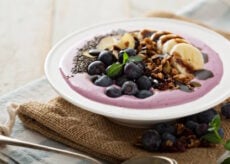The Top 3 Foods You Need to Avoid This Flu Season

It seems like no matter how diligent we are to avoid contact with germs, at some point or another, someone in the family will bring home something dreadful. Cold. Flu. Upper respiratory gunk. Stuffy nose. Body aches. Fever. And if you’re like me, you want to stop the germs before they have any chance to take hold! (As a dad, no matter how sick I am, I know I’m never truly “off duty.”)
Of course, the most common way viruses and all their nasty symptoms are spread is through hand-to-hand or hand-to-face contact. That is, you touch the same surface that someone who is carrying this virus also touched, brush your hair off your face, and bam! You’ve been exposed! Sure, it’s a good idea to wash your hands as much as you can and even keep a bottle of hand sanitizer on your person, but sadly, you can’t wash other people’s dirty paws.
Fortunately, just because you have been exposed to a virus doesn’t necessarily mean you’ll “catch” it. In fact, when your immune system is running at full-throttle, it can often fend off those viruses without even a hint of a symptom. And there are foods you can enjoy every day that can help your immune system function fully (think: delicious vegetables, quality proteins, and sweet low-sugar fruits).
Other foods, however, can diminish how well your immune system functions, leaving you at greater risk of catching whatever the guy who’s sneezing and coughing at the other end of the aisle has.
So, the real question is: what foods should you avoid that may impair your immune system?
3 Foods to Avoid This Flu Season

1. Sugar
You knew sugar was going to be on this list, didn’t you? In fact, it’s the #1 food you should avoid because of its ability to devastate your immune system’s ability to function.
Controlling your sugar intake is key to optimizing your immune system because sugar—especially in highly processed forms like high-fructose corn syrup—actually feeds the “bad” bacteria in your gut.
This is important because your gut houses 80% of your immune system, and your immune system function depends largely on an optimal ratio of “good” to “bad” bacteria. Anything that decreases this ratio (i.e., increasing “bad” bacteria) will compromise your immune system, which makes you more susceptible to catching the cold and flu. Sugar also provides zero, nada, nil nutrition.
So, it’s really important to limit your overall sugar intake to keep your immune system running at its peak. Low-sugar fruits, like strawberries, raspberries, cherries, blackberries, and pineapple can be included, of course, but don’t overdo it—especially during cold and flu season.

2. Refined Grains
Refined grains and carbohydrates can act similarly to refined sugars because of the lack of nutrients and fiber. The digestive system does a great job of breaking down these simple carbs. This leads to spikes and drops in blood sugar and insulin levels. So it’s almost equivalent to eating sugar.
Instead, focus on quality, whole, minimally processed grains to optimize your immune system because the healthier you are, the stronger your immune system. Try some of the delicious new options available, like quinoa, amaranth, or buckwheat to add additional nutrition and variety to your carb intake.

3. Trans Fats
Other foods to avoid include trans fats and vegetable oils (i.e., soybean oil) that are high in omega-6 fatty acids. These fats trigger inflammatory responses, which are under the control of your immune system.
If your body’s immune system is busy dealing with inflammatory fats, you can bet you’re less likely to fend off the cold or flu virus effectively.
Trans fats are found in fried foods, baked goods, and many pre-packaged processed foods. You’d be well advised to avoid these at all costs because of the many ravaging effects on your health.
Now you know why a strong immune system starts with a healthy nutrition plan. So with just a bit of planning and experimentation, you can easily avoid the top three damaging foods this flu season. You’ll be giving yourself and your family tools they need to help fight off the sniffles, body aches, and all the other nasty symptoms of the cold and flu before they start.







